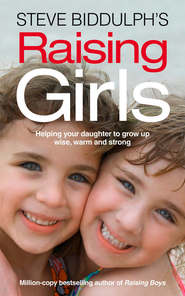По всем вопросам обращайтесь на: info@litportal.ru
(©) 2003-2024.
✖
The Complete Parenting Collection
Автор
Год написания книги
2018
Настройки чтения
Размер шрифта
Высота строк
Поля
All kids benefit from these learning games – but for boys it is also a preventive step because of their disposition to be poorer at language if we don’t help them along. And it’s fun to do, anyway!
Dr Jenny Harasty advises that if you have worries about your boy’s speech and language development (if he isn’t talking as well as you think he should), trust your intuition. Speak to a speech therapist from your local hospital or community health centre. Sessions of speech therapy are fun for children and can make all the difference to a good start.
Whether the cause is hormonal or environmental, there is no doubt that these brain differences exist between men and women today. Because of their more connected brain halves, older women who suffer strokes usually recover more speedily and completely than men: they can activate extra pathways to the other half of their brain to do the job of the damaged parts. Girls who have learning problems improve more quickly with tuition for the same reason. And boys are more prone to problems resulting from brain damage at birth, and so on. This may explain the greater numbers of boys with learning difficulties, autism and many other disorders.
Why is it important to know about brains?
Knowing about the differences in boys’ brains helps to explain some practical difficulties that boys have, and what to do about them.
If your brain is somewhat less connected from right to left, you will have trouble doing things well which need both sides of the brain. This involves skills such as reading, talking about feelings and solving problems through quiet introspection rather than by beating people over the head! Do these problems sound at all familiar to you? So now can you see the importance of all this brain research?
Danger: sexism alert!
There is a vitally important point to be made here. To say that ‘boys are different’ can very easily turn into an excuse for saying ‘they are defective’ or, worse still, ‘they can’t help it’. The same sort of generalisations were once applied to girls: ‘They’ll never be any good at science or engineering’, ‘They’re too emotional to be in responsible jobs’, and so on. So please take the following points on board very seriously:
The differences are slight for most people.
They are only tendencies.
They don’t apply to every individual.
Most important of all, we can help boys to overcome them.
Helping the brain to grow
We can work to help boys read better, express themselves better, solve conflicts better and empathise better – and so help them to be great human beings. Schools have equity programs to help girls in Mathematics and the sciences so they have access to these careers. We are now beginning to see that we can help boys with English, Drama and so on, which can better equip them to live in the modern world. (For some great ways to do this, see the chapter on schools, ‘A revolution in schooling’ (#litres_trial_promo).)
Our brains are brilliant and flexible devices, always able to learn. Parents can teach a boy how to avoid getting into fights by working out better ways to join in a game or solve a dispute peacefully. They can help a boy learn skills like:
how to figure out people’s feelings from their facial expressions
how to make friends and join in a game or conversation, and
how to read his own body signals – for example, to know when he is getting angry and needs to walk away from a situation.
By working on these skills with their sons, parents are building connections from one side of their son’s brain to the other.
PRACTICAL HELP
STARTING SCHOOL: WHY BOYS SHOULD START LATER
Brain differences have one huge implication – that of deciding when boys should start school. Read this next section carefully if you have a small boy: it may make a huge difference in his life.
At the age of five or six, when children start serious schooling, boys’ brains are an astonishing six to twelve months less developed than girls’. They are especially delayed in what is called ‘fine-motor coordination’, which is the ability to use their fingers carefully and hold a pen or scissors. And since they are still in the stage of ‘gross-motor’ development, developing the nerves to their bigger arm, leg and body muscles, they will be itching to move their bodies around – so they will not be good at sitting still. In fact, until they finish their gross-motor development, they will not gain fine-motor skills. For boys, one leads to the other. (Girls do it in reverse: their brains go straight to finger coordination, and they often need help in body strengthening by bouncing on trampolines and playing basketball or swimming.)
The other delay boys experience is in using words well. This affects being able to tell a teacher what they need, answer questions in class, and communicate verbally with other children. Many boys at five are still very young socially, and not really ready for the demands of a school environment. In talking to early childhood teachers, from country schools in outback Australia to big international schools in Asia and Europe, the same message comes through: ‘Boys should stay back a year’.
For all kids, boys and girls, the calendar is a terrible way of deciding who should start school. Kids vary so much, and with a once-a-year intake some will always be young for their year. New studies from the UK show that kids who are young for their year actually do worse in school right through. Staying back for a year in these cases can be just the thing to make school more of a success in the twelve years following. It’s important to treat every child as an individual case and to think about each, not in terms of ‘how old?’, but rather ‘how ready?’ In boys’ cases, the answer is often: not yet.
KNOWING WHEN TO START
It’s clear that all children should attend nursery or half-day preschool from around four years of age, since they need the social stimulation and wider experiences it provides (and because parents need a break!). Unlike childcare, preschool has fully trained teachers who provide playful but appropriate learning experiences that are a halfway step to school. (Daycare centres may have ‘early learning’ in their names, but this is really just a marketing ploy: as one staff member told me, ‘That just means we have letters on the blocks’.)
In preschool or nursery, it will become clear which boys are ready for school – they are happy to sit and do work in books or craft, and are able to talk happily – and which boys are still needing to run about, and are not yet good with a crayon or pencil. Most boys will fall into the second group.
Based on your own observations, on discussion with the preschool teacher, and perhaps checking out what is expected of children going into primary school, you will soon get an idea – ready, or not ready yet. By taking another year in preschool, your boy has a whole year more to get ready to do really well in primary school. For most boys, this would mean that they move through school being a year older than the girl in the next desk – which means they are, intellectually speaking, on a par with the girls. By the late teens, boys catch up with girls intellectually but, in the way schools work now, the damage is already done. The boys feel themselves to be failures, they miss out on key skills because they are just not ready, and so get turned off from learning.
Holding boys back is also much less unkind. Sitting still at a desk is often hard and painful for small boys. In early primary school, boys (whose motor nerves are still growing) actually get signals from their body saying, ‘Move around. Use me’. To a stressed-out Grade 1 teacher, this looks like misbehaviour.
A boy sees that his craft work, drawing and writing are not as good as the girls’, and thinks, ‘This is not for me!’. He quickly switches off from learning – especially if there is not a male teacher anywhere in sight to give that sense that learning is a male thing, too. ‘School is for girls’, he tells himself.
There is much more that we can do to make school boy- friendly. This is explored in the chapter on schools, ‘A revolution in schooling’. But the first question – is he ready yet? – is perhaps the most important place to start.
In school, the same help is needed. One young female Maths teacher I know rarely lets a lesson pass without using some practical, hands-on example of what is being studied – often going outside to do it in a practical way in the playground. She found that the less motivated of her students could get a grasp of the concepts if they could see them in practice and do physical things with their bodies to comprehend the idea being taught. They were getting right-brain concepts to link to their left-brain understanding – using their strengths to overcome their weaknesses. This teacher’s boy students loved learning from her, she was adventurous, keen and cared about them.
Boys are not inferior – just different
Having a well-developed right side of the brain, as boys tend to do, has many pluses. As well as having Mathematical and mechanical abilities, males tend to be action-oriented – if they see a problem, they want to fix it. The right side of the brain handles both feelings and actions, so men are more likely to take action, while women tend to mull over something to the point of total paralysis! It requires extra effort for a man to shift into his left hemisphere and find the words to explain the feelings he is registering in his right hemisphere.
Germaine Greer has pointed out that there are more male geniuses in many fields, even though many may be imbalanced characters on the whole, needing someone to look after them (usually a woman)!
In an era when advertising and the media mostly portray men doing bad or stupid things, it’s important to remember (and to show boys) about the men who built the planes, made the art and music, laid the railroad tracks, invented the cars, built the hospitals, discovered the medicines and sailed the ships that made our world so wonderful, safe and interesting. There’s an African saying, ‘Women hold up half the sky’. But, clearly, men hold up the other half.
A new kind of man
The world no longer needs men who can wrestle with buffaloes or cut down trees with a flint axe. In the modern world, where manual or mechanical labour is less and less needed, we need to take that masculine ability and energy and redirect it to a different kind of heroic effort. This means adding language and feeling skills to the thinking and doing skills of boys – making a kind of ‘superboy’ who is flexible across all kinds of skill areas.
If you think about it, the great men of history – Gandhi, Martin Luther King, Buddha, Jesus – actually were like this. They had courage and determination, along with sensitivity and love for others. It’s an unbeatable mix, and it is certainly needed today.
IN A NUTSHELL
The gender differences created by male hormones and male genes need to be handled in practical ways. The following sums up what you can do with your boy to help him be a ‘new kind of man’.
Chapter 5 What dads can do (#ulink_4e3260a5-b648-5e83-a24b-986a01551b5e)
My daughter is now a young woman, yet it seems like only yesterday that she was being born. That was a day to remember! We had planned on a home birth, but had a back-up plan for a hospital transfer if necessary. And sure enough, the labour ended with an emergency Caesarean at about 3 a.m. – not at all what we had hoped for. The pact I’d made with my wife Shaaron was, ‘Nobody else takes this baby’. So I was there in the operating theatre, and our baby went straight from the weighing scales and into my arms.
While Shaaron recovered from the operation over the next few days, I slept on a stretcher bed on the floor of her hospital room, our baby tucked beside me, which often caused shrieks of shock from nurses who stumbled in for the 2 a.m change of shift. It was a great system – Shaaron knew our baby was close and safe, not off in a nursery somewhere, and I could hand her up to Mum for a feed at any time. Sometimes a nurse would discreetly ask Shaaron if this was what she really wanted. She would smile and say, ‘Yes, of course!’
Fighting to be a dad
The experience of my daughter’s birth showed in a way what it is like to be a dad these days – you have to make a firm stand, sometimes even fight, to be allowed to be a dad. The world doesn’t seem to want you to be an involved parent: it would rather have you stay late at the office. Someone else will teach your children to hit a ball, play the piano and believe in themselves – you just pay the bills.
Luckily, fathers are fighting their way back into family life, and very welcome they are, too. Twentieth-century fathering was something of a disaster. Our fathers’ generation included a few great dads, but most men of previous generations proved their love by working, not by playing, cuddling, talking or teaching – the things that kids really love. In those hard times of poverty and war, some dads were violent, scary or drank too much. Many were traumatised and were hard to get close to. Some men simply walked out on their families and never came back. So when we come to fathering our own children, it can feel strange, since we may have little knowledge of what good fathering looks like. We only have half the pieces of the jigsaw.
But things are looking up. We know from studies across the developed world that fathers have increased the time they spend with children by 400 percent since the 1970s. Young dads today are determined to spend more time with their kids, and most of them succeed. In fact, with fatherhood, you never ‘fail’, as long as you don’t quit. As long as you are willing to have a go, you will always achieve more than you realise. Don’t be tempted to leave all the parenting to your partner. As we’ll see in this chapter, men bring different things to parenting to what women bring, things that are unique and irreplaceable. The more you do with your kids, the more you will rediscover your talents at fathering and your own unique style. There is nothing as satisfying as raising great kids.
Reviving a lost art











